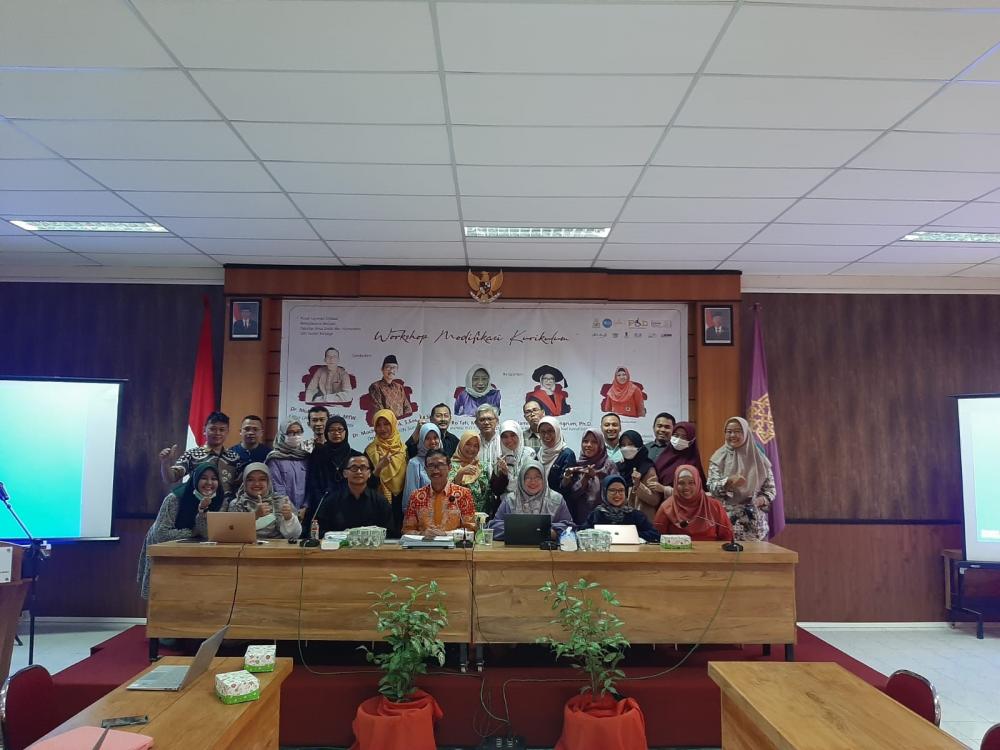Introduction to UDL-based Inclusive Education through Curriculum Modification Workshop for Communication Studies Study Program

Communication Studies study program had the opportunity to take part in a Curriculum Modification Workshop organized by the Difa
It is no stranger and an honor for the Communication Studies Program (IKOM) which is now the study program that receives the most students with disabilities, especially in the Faculty of Social Sciences and Humanities (FISHUM). This time, the Communication Studies study program had the opportunity to take part in a Curriculum Modification Workshop organized by the Difabel Service Center (PLD) of UIN Sunan Kalijaga at the Fishum Interactive Center (IC). This event was attended directly by the chairman of LPPMDr. Muhrisun, S.Ag., BSW., M.Ag., MSW., Founder of PLDRo'fah, MA., Ph.D.and chairman of the PLDDr. Astri Hanjarwati, S. Sos., MA
This event was opened directly by the Dean FishumDr. Mochamad Sodik, S. Sos., M.Sc.he appreciated this PLD activity in seeking inclusive education for students with disabilities, especially in the Fishum environment. "The Communication Studies Study Program is the study program that most often accepts students with disabilities, especially in the Fishum environment, this is important if there is a new learning model for all of us here," he explained while opening a curriculum modification workshop. The head of LPPM further reminded that PLD UIN Sunan Kalijaga was the first institution in PTKIN to become a leader in inclusive education. "Hopefully this workshop will lead Fishum to become a faculty leader who provides space especially for students with disabilities so that they can realize good inclusive learning," he explained.
Furthermore, Universal Design for Learning (UDL) is the latest breakthrough from PLD to introduce a curriculum that is suitable not only for students with disabilities but also for all students of UIN Sunan Kalijaga Yogyakarta. "UDL's Basic premise is to provide all students with a fair opportunity to achieve high standards by providing engagement, representation and action and expression", explained the Founder of PLDRof'ah, MA., Ph.D. he also added that the provision of infrastructure is a learning tool to find out the actions and expressions of students. "It's not the time for lecturers to explain students in front by reading books and presentations, the students will definitely run away", he said with a cheerful smile.
Basically, PLD is not a solution for all but we must continue to oversee changes in the learning process that can bridge ordinary students with disabilities every year. "We must try to change our minds on the other hand, new broader thoughts where later we can all carry out our obligations, especially as a government institution that is subject to the law," added the founder of the PLD while telling his experience of guarding the PLD until now.
In the next opportunity,Jamil Suprihatiningrum, S.Pd.Si., M.Pd.Si., Ph.D.as the PLD Expert Team explained more about the technical preparation of the PLD when the lecture was to be held, the PLD would notify each study program regarding the disabled student. Like how many students there will be fishum for each study program, even informing the types of students with disabilities who will enter the study program so that this becomes a special readiness for each study program.
The Communication Science Study Program was present, represented byDr. Diah Ajeng Purwani, S.Sos, M.Sias secretary of the Communication Studies study program and several IKOM lecturers, he said that in the future it is hoped that there will be intense communication between PLD and each study program. “It is good that PLD can attend the meetings of each study program. Like when communicating with students with visual impairments, it feels like more guidance is needed from PLD because it is related to visual tasks,” explained the IKOM study program secretary. He added that now a solution was created by creating a special class for students with disabilities when the IKOM study program got the most disabled students at Fishum. He also hopes that the sharing session will make study programs and PLD stronger in the future to provide better services from year to year, especially for students with disabilities.
